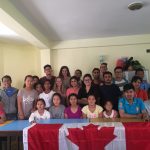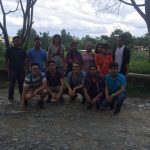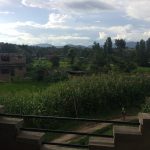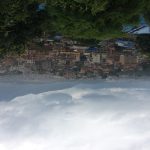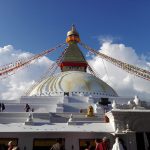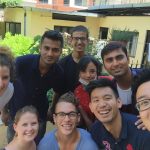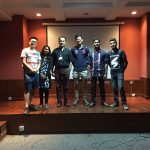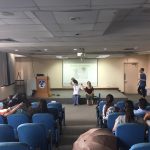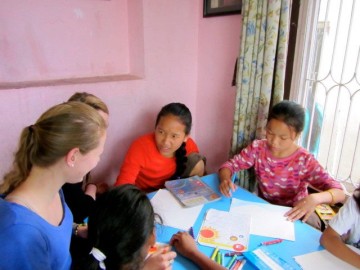2018/2019 Team Leader: Keenan Klassen
Health Trek Nepal is an organization of UBC students started in 2011 that participates in a learning exchange with medical students at the Patan Academy of Health Sciences (PAHS) in Kathmandu, Nepal. Health care access in Nepal is limited, especially to people in remote and rural areas. PAHS aims to improve the health of Nepalese by producing doctors who are willing and able to provide health care to disadvantaged people living in remote or rural areas. UBC students collaborate with Nepalese students in a cultural exchange to better understand health care in each country, share their knowledge on medical subjects, improve language and communication skills, and participate in research.
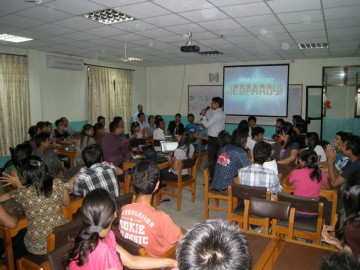 The Republic of Nepal and its people have endured significant hardship over the last three decades. A decade-long civil war was, in part, a result of the disparity of the health status between those living in urban and rural areas. This has only been compounded by the devastating earthquake in 2015 and its aftershock. The earthquake killed more than 8,000 people and injured more than 21,000. The reality of the health care disparity between urban and rural Nepal is abundantly clear: a two-decade difference in life expectancy (the life expectancy is 37 in some remote regions) and a thirty-three fold difference in physicians per capita. While health professional availability is only one part of the disparity, it is a critical one.
The Republic of Nepal and its people have endured significant hardship over the last three decades. A decade-long civil war was, in part, a result of the disparity of the health status between those living in urban and rural areas. This has only been compounded by the devastating earthquake in 2015 and its aftershock. The earthquake killed more than 8,000 people and injured more than 21,000. The reality of the health care disparity between urban and rural Nepal is abundantly clear: a two-decade difference in life expectancy (the life expectancy is 37 in some remote regions) and a thirty-three fold difference in physicians per capita. While health professional availability is only one part of the disparity, it is a critical one.
The Nepali people have shown a remarkable resilience and have undertaken innovative political, social, educational, and health-related endeavours that serve as beacons of hope to other beleaguered nations. One such homegrown initiative is the Patan Academy of Health Sciences (PAHS). This new, national health sciences university, designed from the ground up on the principles of social accountability, admitted its first cohort of medical students in June 2010.
UBC Medicine faculty have been a part of a multi-university International Advisory Board supporting the development and implementation of PAHS. Dr. Carol-Ann Courneya, Dr. Robert Woollard, and Dr. Jane Gair have contributed to feasibility studies, partnership support, and faculty development.
2018/2019 Updates
In 2019, the Health Trek Nepal team followed after previous years and started the trip off with a 7-day trek to Annapurna Base Camp. Since each of the members of the 4-person team were from different distributed sites, the trek provided a great platform for getting to know one another.
In addition to working with PAHS students, the team gained some experience shadowing in Patan hospital in internal medicine and emergency. They also continued the health screen at Sonrisa orphanage, receiving help from local physicians as well as medical students from the University of Calgary.
The Health Trek team tagged along with students from Memorial University and visited the Nick Simons Institute, where they learned about their mission to innovate solutions in rural healthcare through training and hospital support.
They also visited the Spinal Injury Rehabilitation Center, where they met Dr. Raju Dhakal to appreciate the excellent care that this tertiary center provides its patients and the challenges it faces in the political landscape of Nepal.
Donations were collected from friends and family using social media, and were used to better the lives of the children in Sonrisa and those receiving care for spinal cord injury at SIRC.
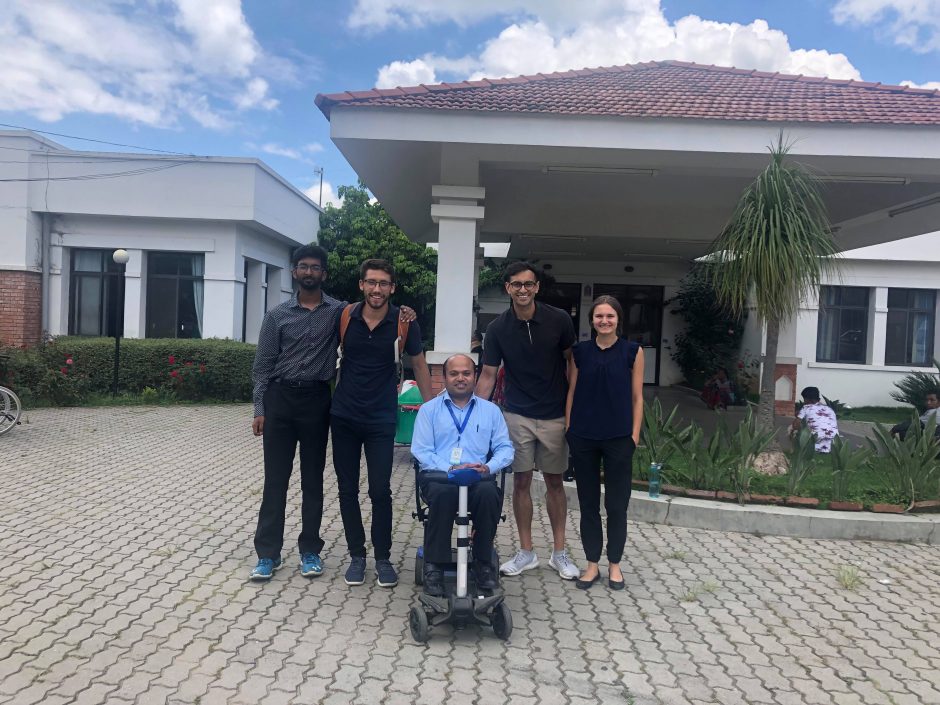
2017 Updates
In 2017, This year, Health Trek Nepal continued with many of the past projects. The Health Card project was continued at Sonrisa Orphanage and local physicians were interviewed for qualitative assessment of how to improve the Health Cards for ease of use. As well, improvements to the design of the cars in addition to laminated, keychain-sized copies of the health cards were introduced to the project. Workshops were held with the PAHS students to address mental health in medical students, patient-physician interactions, and to hold an interactive exchange between Canadian and Nepalese culture. We also had the chance to shadow in the emergency, pediatrics, and internal wards of Patan Hospital, and set up observership opportunities at the world famous Tilganga Eye Institute.
In the future, Health Trek Nepal plans to continue to organize workshops for the PAHS students according to the interests and needs of both groups of students. We also hope to work with the PAHS students to conduct research, run health-promotion workshops and health screens in Kathmandu, rural Nepal and at Sonrisa Orphanage. By working with the PAHS students at school and in their community, we hope to strengthen the connection between UBC and PAHS students, and to continue to learn from one another. As well, we hope to continue improving the design of the Health Card and health screen intake forms so that local physicians and medical students can capture a complete picture of the children during history taking and physical exams. We envision an expansion of the Health Card to include other orphanages and potentially more hospitals so that more children can have a mobile version of their health records.
Commencing in 2011, UBC Medical Students collaborated with PAHS students through Health Trek Nepal, a pilot program beginning in June and July 2011 to identify opportunities for learning exchange in Kathmandu, Nepal. UBC students worked with Nepalese students to better understand health care in each country, share knowledge on medical subjects, improve language and communication skills, and participate in research. The UBC students additionally ran workshops for the Nepalese students on time management and study skills in medical school. Although these are skills that are second-nature to the majority of Canadian medical students, the Nepalese students are for the most part entering medical school straight out of high school, and were interested to hear how UBC medical students dealt with the large volume of new information.
In June 2014, the fourth group of medical students from UBC travelled to Kathmandu to partake in a cultural exchange with the PAHS medical students. After meeting 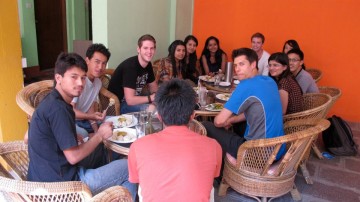 with and recognizing what the 3rd batch (Year 2) PAHS students were interested in gaining from the partnership, the UBC students conducted a number of workshops and interactive sessions. These gatherings focused on relaying study and stress/time management tips, mental health, sharing information about life in Canada as well as our journeys through medical school, and exploring the differences in health care and rural medicine between Canada and Nepal. The UBC students were able to witness the PAHS student experience as they joined the students for some of their classes and group sessions. The students also developed friendships with one another by exploring Kathmandu, enjoying meals, and playing sports together while learning about one another’s culture.
with and recognizing what the 3rd batch (Year 2) PAHS students were interested in gaining from the partnership, the UBC students conducted a number of workshops and interactive sessions. These gatherings focused on relaying study and stress/time management tips, mental health, sharing information about life in Canada as well as our journeys through medical school, and exploring the differences in health care and rural medicine between Canada and Nepal. The UBC students were able to witness the PAHS student experience as they joined the students for some of their classes and group sessions. The students also developed friendships with one another by exploring Kathmandu, enjoying meals, and playing sports together while learning about one another’s culture.
In 2015, in addition to the partnership with PAHS students, UBC students devoted a significant amount of time working with the children at Sonrisa Orphanage. Sonrisa is currently home to 16 children, ranging in ages from 6-16. Following up on a project initiated in 2013, UBC students were able to arrange a general medical check-up for each child, updating medical files that were created the previous year and initiating records for children new to Sonrisa. Coupled with this physical exam, the UBC students were able to update the detailed histories that were created the previous year to create a comprehensive and updated health care package for each child. This work was done under the supervision of a local physician, and these health records will be incredibly useful for any future medical visits the children may have.
The group also conducted female health workshops with the girls at the orphanage, initiated a photovoice project which empowered the children to express their own views of their health through art, and finally, helped tutor the children for their school exams in a range of subjects. At the end of the stay, UBC students got together with the children for a fun filled afternoon of games, dancing, and making a traditional meal of “Mo-Mos” (Nepalese dumplings) to share together.
The visit to Nepal allowed the UBC students to be tourists as well. One group of UBC students was able to embark on a trek through the Annapurna range of the Himalayas, while others were able to visit the Chitwan National Park and do an elephant safari! While these activities were not the focus of the trip, they were an excellent way for the students to appreciate the beauty and wildlife that Nepal has to offer, and needless to say, were a highlight for many. Including PAHS students in our explorations of Kathmandu allowed us to develop friendships and have more organic discussion about life in Nepal and Canada.
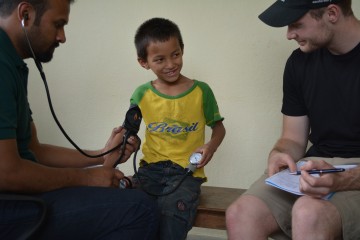 Before leaving for Nepal, the Health Trek Nepal team raised money through a number of means, such as a bake sale and solicitations from private donors. Approximately 50% of this money was directed towards purchasing Littman stethoscopes for the first-year PAHS scholarship students, who otherwise would not have had the funds to purchase a high-quality stethoscope, while the remaining funds were donated to Sonrisa Orphanage.
Before leaving for Nepal, the Health Trek Nepal team raised money through a number of means, such as a bake sale and solicitations from private donors. Approximately 50% of this money was directed towards purchasing Littman stethoscopes for the first-year PAHS scholarship students, who otherwise would not have had the funds to purchase a high-quality stethoscope, while the remaining funds were donated to Sonrisa Orphanage.
Click here for more photos from the Nepal Health Trek Project!
